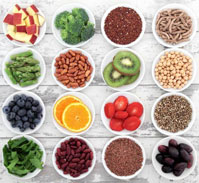What is Dietary Fibre?
More commonly known as fiber and/or roughage, Dietary Fiber is the indigestible portion of plant food that passes through our digestive system absorbing water along the way. This process eases the body's bowel movements.
But if fiber is 'indigestible', why is it so vital for our well-being?
The digestive enzymes in our body cannot break fiber down, which is why the latter acts as a binding agent for toxins. In layman terms, what fiber essentially does is evict toxins out of our system through our digestive tract.
Types of Fibre
There are two types of fiber: soluble and insoluble.
-

Soluble Fibre
Soluble fiber is highly soluble in water and changes form as it pushes through the digestive system, while being fermented by bacteria (and accompanying toxins). As the soluble fiber absorbs water, it assumes a gelatinous form.
-

Insoluble Fibre
Insoluble fiber does not change form on its way through the digestive tract. It helps prevent constipation and assists in body waste elimination. All plant-based foods contain both types of fiber, but rarely, if ever, in equal proportions.
Sources of fibre
Here is a list of foods highly rich in fiber:
